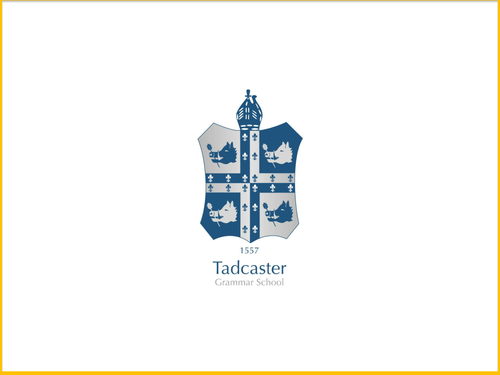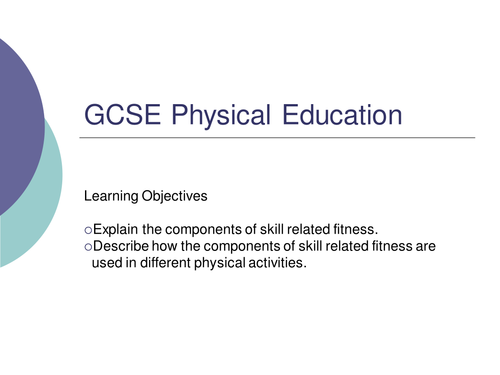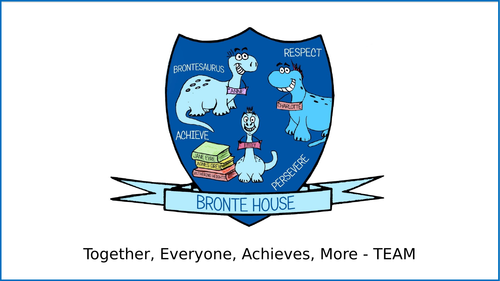
118Uploads
36k+Views
4k+Downloads
All resources
Sale

Assembly - Positive Thinking - Growth and Fixed Mindset
The assembly is based around a fixed and growth mind set. It uses a series of clips taken from I'm a Celebrity Get Me Out of Here from a couple of years ago when Helen Flannigan was voted to do a number of Bush Tucker Trails. The first two clips show here saying that 'she isn't feeling this today' and then quits before really having a go. The next clip shows here saying that she is going 'to give it her very best' and she completes the trial gaining all of the stars. The message is about approaching a task with a positive mindset. I then list the challenges that each Key Stage will face during the academic year and the importance of being positive and giving everything 100% effort.
Sale

GCSE PE - Skill Related Fitness
Learning Objectives:
Explain the components of skill related fitness.
Describe how the components of skill related fitness are
used in different physical activities.
Sale

GCSE PE - Skill Related Fitness
Learning Objectives:
Explain the components of skill related fitness.
Describe how the components of skill related fitness are
used in different physical activities.
Sale

A Level PE - Recovery Process
A Level Exercise Physiology lesson. Learning objectives:
- Explain how the body returns to its pre-exercise state.
- Identify the alactacid and lactacid debt components.
- Discuss the implications of recovery for training sessions.
Sale

A Level PE - Principles of Training
A Level Exercise Physiology lesson. Learning objectives:
- Introduce the Principles of Training (‘Mrs Vopp Testing WC’).
- Give specific sporting examples for all principles of training.
- Show example PowerPoint for task next lesson.
Sale

A Level PE - Energy Continuum
A Level Exercise Physiology lesson. Learning objectives:
- Identify the predominant energy system used related to the type of exercise.
- Explain the inter-changing between thresholds during an activity.
- Discuss the effect of level of fitness, availability of oxygen and food fuels, and enzyme control on energy system used.
Sale

A Level PE - Body Composition One
A Level Exercise Physiology lesson. Learning objectives:
- Explain what is meant by body composition.
- Describe the different methods of assessing body composition.
- Complete a Skinfold Calliper Experiment.
Sale

A level PE - Performance Enhancement One
Learning objectives:
- Identify and describe Ergogenic Aids.
- Discuss carbohydrate loading.
- Critically analyse a number of Ergogenic Aids.
Sale

A Level PE - Factors Impacting on Popular Recreation as a Result of Industriailisation
A Level Physical Education Skill Acquisition lesson. Learning Objectives:
Identify the main factors that effected rational recreation in the second half of industrialisation.
Be able to explain how the five influences affected rational recreation in the second half of industrialisation.
Understand the changes between industrial and pre-industrial Britain.
Sale

A Level PE - Aerobic Capacity One
A Level Exercise Physiology lesson. Learning objectives:
- Define and describe the link between aerobic capacity and VO2 max.
- Describe the methods of evaluating aerobic capacity.
Sale

A Level PE - Aerobic Capacity Two
A Level Exercise Physiology lesson. Learning objectives:
- Describe different types of training used to develop aerobic capacity.
- Explain the energy system and the foods fuels used during aerobic work.
- Detail the physiological adaptations that take place after prolonged periods of aerobic physical activity.
Sale

A level PE - Performance Enhacement Two
Learning objectives:
- Critically analyse a number of Ergogenic Aids.
- Discuss the use of cooling aids to reduce core temperature and aid recovery.
- Outline the use of training aids to increase resistance.
Bundle Sale

GCSE PE - Theory Lesson Bundle
The bundle includes lessons on the following topics:
Performance Enhancing Drugs
The Cardiovascular System
The Muscular System
The Respiratory System
The Skeletal System
Different Body Types
Risk Assessment and Preventing Injuries
Sale

A Level PE - Muscle Fibre Types
A Level Anatomy and Physiology lesson. Learning objectives:
- Identify the different types of Muscle Fibre found in skeletal muscles.
- Discuss Muscle Fibre types in relation to physical activity.
- Introduce the Muscle Fibre Continuum
Sale

A Level PE, Sport Psychology, Anxiety
Learning Objectives
Define and identify somatic, cognitive, competitive trait and competitive state anxiety.
Understand and explain the advantages and disadvantages of using observations, questionnaires and physiological measures to measure anxiety.
Be able to apply and justify the impact of different types of anxiety on sport performance.
Sale

Assembly - Perseverance, Never Give Up
The focus of this assembly is about perseverance. The first clip is taken from the film 'Catch me if you can'. It takes a scene where someone describes two mice falling into a bucket of milk. Once drowns but the other tries so hard to get out that it churns the milk into butter and walks out the bucket.
The next clip is taken from 'Educating Yorkshire'. It shows a young man with a speech impediment trying to talk through some work and getting frustrated. The next clip is one of him speaking in the Year 11 leavers assembly.
The next section shows Andy Murray getting upset after losing the Wimbledon final followed by the moment he won Wimbledon the following year.
I then go on to talk about how in these situations both people went on to be successful by not giving up and persevering with the challenges ahead of them. This then links in to the challenges that the students will face this academic year. The assembly finishes with a quote by Gary Player who once said “It's funny but the more I practice, the luckier I get.”
Sale

Assembly - Anti-Bullying, Think Before You Post
This assembly focusses on anti-bullying but more specifically cyber bullying.
The opening part of the assembly defines bullying and also explains the different types of bullying providing examples of each in schools. These are verbal, social and physical bullying.
The next section of the assembly uses a video called 'In Real Life' which is a social experiment that shows what happens when online bullying is taken offline. This is a very cutting video where people say some quite horrific to people in the public. The things that the people are saying are quotes taken from other people's social media. The moral of the video is that a lot of people say things online that they would never dream to say to someone face to face.
This is followed by some key facts and figures about cyber bullying and then some general tips with the tag Think Before YOU Post.
The final section of this assembly shows how students can report bullying at my school. This will need to be amended for each individual school.
Sale

A Level PE - Sport Psychology, Attitudes
Learning Objectives
Introduce the triadic model and the different components of attitudes.
Understand the formation of different attitudes.
Able to explain and justify changing attitudes through cognitive dissonance and persuasive communication.
Sale

A Level PE, Sport Psychology, Arousal
Learning Objectives
Introduce the Drive Theory, Inverted U Theory, Catastrophe Theory and Zone of Optimal Functioning Theory.
Understand the characteristics of Peak Flow Experience .
Able to explain and justify the practical applications of theories of arousal and their impact on performance.
Sale

British Values - Mutual Respect and Tolerance
This assembly focuses on one of the British Values with regards to Mutual Respect and Tolerance.
The first slide is a definition of respect “A regard for the feelings, wishes, or rights of others”.
The next slide asks the students to compare and contrast the sports football and rugby with regards to the respect shown by both the players and spectators. This should spark debate about the respect and possible lack of respect shown in each. The following slides show footballers abusing referees and and then an article detailing how many referees are leaving football due to the abuse that they take.
A short video of a rugby referee then follows this which demonstrates how rugby players generally show great respect for the referee as he tells off 30 men who were not following the rules without any of them questioning him in any way.
The next two slides show a recent Manchester football derby where the police had to create a line to keep the fans away from each other. The next slide shows two rugby fans stood together at a game shouting on their teams.
This is the hook into the theme of mutual respect because why does rugby seem to have a culture of respect whilst football does not? I then explain that when people show each other respect this makes for a happier experience for all people involved.
I then ask the students how can we show respect for each other at our school and within our house to make it a nice place to be? I have broken this up into respecting yourself, respecting the environment and then others. Whilst talking about respecting others I then introduce the term mutual respect and explain why this is important. This leads into discussion about that fact that in Britian we live in a diverse nation made up of many different cultures, languages, races, and backgrounds and how we can learn from others.
I then finish the assembly with a golden rule about mutual respect: Treat others as you want to be treated




















